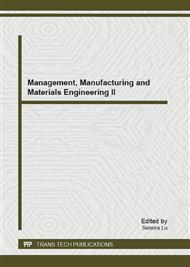[1]
L. Ding, Knowware System for the Development of Intelligent Systems", proc. the 7th International Conference on Intelligent Technologies (InTech, 2006), pp.201-210, Taipei, Dec (2006).
Google Scholar
[2]
L. Ding, A Model of Hierarchical Knowledge Representation – Toward Knowware for Intelligent System, Journal of Advanced Computational Intelligence & Intelligent Informatics, Vol. 11, No. 10, pp.1232-1240, (2007).
DOI: 10.20965/jaciii.2007.p1232
Google Scholar
[3]
L. Ding and S. Nadkarni, Automatic Construction of Knowledge-Based System Using Knowware System", the 6th International Conference on Machine Learning and Cybernetics (ICMLC, 2007), pp.789-794, Hong Kong, China, Aug, 2007.
DOI: 10.1109/icmlc.2007.4370250
Google Scholar
[4]
J. -S.R. Jang, C. -T. Sun and E. Mizutani, Neural-Fuzzy and Soft Computing: A Computational Approach to Learning and Machine Intelligence, Prentice Hall, NJ, (1997).
Google Scholar
[5]
S.L. Lo and L. Ding, Intelligent Components in Knowware System", proc. 4th International Conference on Innovative Computing Information and Control (ICICIC, 2009), pp.311-314, Kaohsiung, Taiwan, Dec, (2009).
DOI: 10.1109/icicic.2009.249
Google Scholar
[6]
M. Negnevitsky, Artificial Intelligence – Aguide to Intelligent Systems (2nd ed. ), Addison Wesley, (2004).
Google Scholar
[7]
E. Roventa and T. Spircu, Management of Knowledge Imperfection in Building Intelligent System, Springer-Verlag, Berlin, (2009).
Google Scholar
[8]
E. Turban, J.E. Aronson and T.P. Liang, Decision Support Systems and Intelligent Systems (7th ed. ), Prentice Hall, (2004).
Google Scholar


